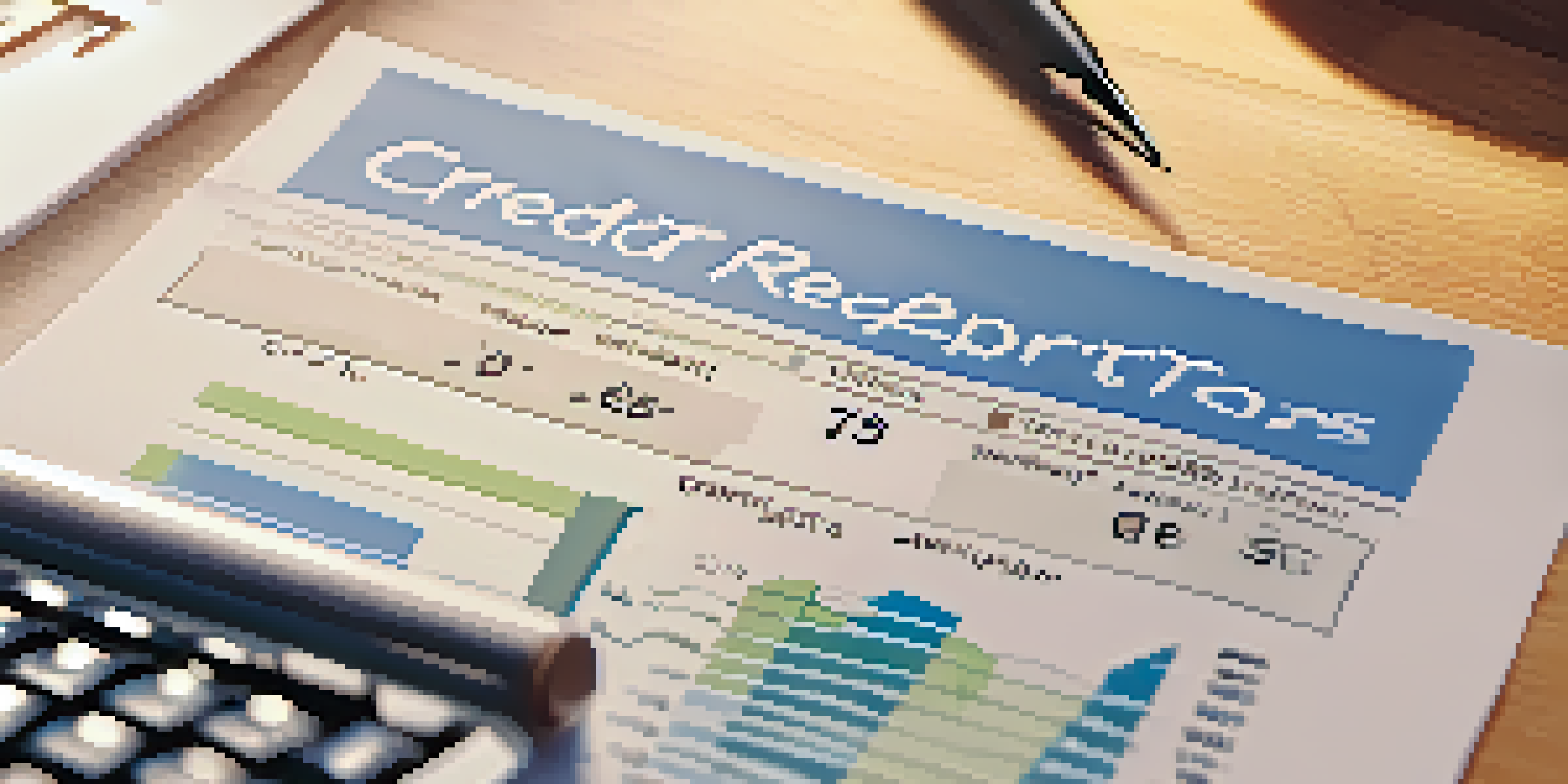How to Improve Your Credit Score Before Applying for a Mortgage

Understanding Your Credit Score: The Basics
Your credit score is a three-digit number that reflects your creditworthiness. It ranges from 300 to 850, with higher scores indicating better credit. Lenders use this score to assess the risk of lending you money, especially for significant purchases like a home.
A good credit score is like a passport to financial freedom.
The score is influenced by several factors, including your payment history, credit utilization, length of credit history, types of credit accounts, and new credit inquiries. Understanding these components can help you identify areas for improvement. For instance, late payments can significantly lower your score, while keeping your credit utilization low can boost it.
Before applying for a mortgage, it's essential to know where you stand. You can obtain a free credit report from each of the major credit bureaus once a year. By reviewing your report, you can spot inaccuracies and take steps to correct them, giving your score a potential boost.
Check Your Credit Report for Errors
Errors on your credit report can drag down your score without you even realizing it. Common mistakes include incorrect personal information, accounts that don't belong to you, and erroneous late payment records. Identifying and disputing these inaccuracies can lead to a quick score improvement.

When you find an error, gather supporting documentation and file a dispute with the credit bureau. They are obligated to investigate your claim, typically within 30 days. If the error is corrected, you’ll see a positive change in your credit report, which can directly impact your mortgage application.
Understand Your Credit Score Basics
Your credit score is a three-digit number influenced by factors like payment history and credit utilization, which lenders use to assess your creditworthiness.
Regularly monitoring your credit report helps you stay informed about your credit health. Consider using credit monitoring services that alert you to changes in your report, giving you a proactive approach to managing your credit.
Pay Down Existing Debt to Improve Your Score
One of the most effective ways to enhance your credit score is by paying down existing debt. High credit card balances can increase your credit utilization ratio, which negatively impacts your score. Aim to keep your utilization below 30%, meaning if you have a $10,000 credit limit, your balance should be under $3,000.
Credit is a tool; if you use it the right way, it can be incredibly powerful.
Start by targeting debts with high-interest rates first, often referred to as the avalanche method. Alternatively, the snowball method suggests paying off the smallest debts first to gain momentum. Whichever strategy you choose, consistently making payments can lead to an improved score over time.
In addition to paying down balances, consider consolidating debts if it makes financial sense. This can lower your monthly payments and simplify your finances, making it easier to stay on track.
Make Payments on Time: A Simple Yet Powerful Habit
Payment history accounts for a significant portion of your credit score, which makes timely payments crucial. Missing just one payment can drop your score significantly. Therefore, establishing a routine that prioritizes on-time payments can help protect and enhance your score.
To ensure you never miss a due date, consider setting up automatic payments or reminders through your bank or credit card provider. If you’re struggling to remember payment dates, a simple calendar alert can make a world of difference.
Pay Down Debt to Boost Your Score
Reducing existing debt, particularly high credit card balances, can significantly improve your credit utilization ratio and enhance your credit score.
Additionally, if you find yourself unable to make a payment on time, communicate with your lender. They may offer options such as payment deferrals or assistance programs to help you maintain your credit standing.
Limit New Credit Inquiries Before Applying
When you're preparing to apply for a mortgage, it's wise to limit new credit inquiries. Every time you apply for a new credit card or loan, an inquiry is recorded on your credit report. Too many inquiries in a short period can signal to lenders that you may be a higher risk, potentially lowering your score.
Instead of applying for new credit, focus on strengthening your existing accounts. If you need to improve your credit utilization, consider asking for a credit limit increase on your current cards rather than opening new accounts. This can help keep your overall utilization ratio in check without adding more inquiries.
Remember, inquiries typically only affect your score for about a year, but their impact can be felt for much longer. So, it's best to be strategic about when and how you apply for new credit.
Keep Old Credit Accounts Open
The length of your credit history plays a role in determining your credit score. Closing old accounts can shorten your credit history, which may negatively impact your score. Therefore, it's generally beneficial to keep older accounts open, even if you don't use them frequently.
Old accounts contribute to your overall credit utilization and can provide a positive credit history, which adds weight to your score. If you're worried about potential fees from an unused account, consider switching to a no-fee version or ensuring it's a card with no annual fees.
Check for Errors in Your Report
Regularly reviewing your credit report for inaccuracies can help you identify and dispute errors that may negatively impact your credit score.
Another advantage of maintaining old accounts is that they can help diversify your credit mix. A healthy mix of credit types—such as credit cards, installment loans, and mortgages—can be beneficial for your score.
Consider Credit Counseling for Expert Guidance
If you're feeling overwhelmed by your credit situation, seeking help from a credit counseling service can be a wise move. These professionals can offer personalized advice and strategies to improve your credit score. They can help you create a budget, manage debt, and understand your credit report in detail.
Many non-profit organizations offer free or low-cost credit counseling services. They can provide valuable resources and workshops to empower you with the knowledge to take control of your credit. This support can be especially beneficial if you're planning to apply for a mortgage soon.

In addition to counseling, some services offer debt management plans, which allow you to consolidate payments through the agency. This can simplify your finances and potentially improve your credit score as you stay on track with payments.